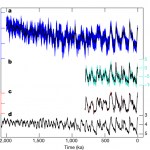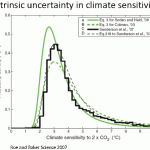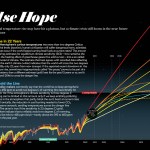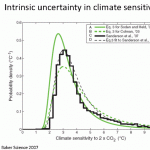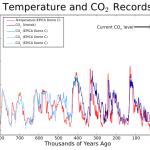climate sensitivity
You've probably already heard about his paper because everyone is all a tizzy about it. There is a fundamental complaint being made about one of the paper's conclusions. I've been paying careful attention to what my colleagues are saying about that one aspect of the paper, and I get their point but I'm not sure if they are right. I'll explain that later.
What everyone so far has almost entirely missed, though, is the actual point of the paper, and that is important and while I'm sure it could be improved with further work, this is good stuff and important.
One of the major contributions…
I'm not going to say anything about this research because I've not read the paper, but it looks important. If someone out there writes something up I'll put a link here.
Here's the deal. Climate sensitivity is, very oversimplified, how much the surface of the planet heats up as we add CO2 and other greenhouse gasses to the atmosphere. More specifically, equilibrium climate sensitivity is the number of degrees C the atmosphere at face height and the sea surface heat up with a doubling of CO2 from pre-industrial levels.
If our atmosphere had just nitrogen and CO2 and that's it, the number…
I recently noted that there are reasons to think that the effects of human caused climate change are coming on faster than previously expected. Since I wrote that (in late January) even more evidence has come along, so I thought it was time for an update.
First a bit of perspective. Scientists have known for a very long time that the proportion of greenhouse gasses in the Earth’s atmosphere controls (along with other factors) overall surface and upper ocean heat balance. In particular, is has been understood that the release of fossil Carbon (in coal and petroleum) as CO2 would likely warm…
I needed a copy of the "False Hope Graph" that Michael Mann painstakingly created for his Scientific American piece "Earth Will Cross the Climate Danger Threshold by 2036" for a presentation I'm doing, but it had to be simpler, leave some stuff off, and be readable across the room on a screen. The original graphic looks like this:
It is a major contribution showing the relationship between climate sensitivity and climate change in the future depending on various important factors. The graphic I made from it is here (click on it to get the big giant version):
You'll notice I left only one…
After 16 minutes, Michael Mann on climate change, climate sensitivity, etc.
Why does Joan of Arc Being look so worried? The fire hasn't even touched her!
Mann uses the analogy of a person jumping (or being thrown?) off a tall building, and as he passes the third floor notes that everything is fine. Another analogy that might be helpful is being burned at the stake. After they tie you to the stake and pile up the wood, you're fine. Then they light the wood on fire and you're still fine. For a while.
The climate sensitivity graph above is from here.
Well before mid century we will probably pass a threshold beyond which we'll really regret having not curtailed the release of fossil Carbon into the atmosphere in the form of Carbon Dioxide. The best case scenario for "business as usual" release of the greenhouse gas is that some of the carbon, or some of the heat (from sunlight) gets taken out of the main arena (the atmosphere and sea surface) and buried or reflected somewhere for a while, and this all happens on a slightly delayed time scale.
The reason we know this is a little thing called science. And, more exactly, physics. And…
Who What When Where
Nic Lewis, an unaffiliated self described climate scientist, and a journalist, Marcel Crok, also unaffiliated, are known climate science denialists. The two of them have an objection to the International Panel on Climate Change (IPCC) conclusions regarding an important thing called "Climate Sensitivity." Perhaps unable to get their work in the peer reviewed literature, the two of them wrote "a report" titled "OVERSENSITIVE: How the IPCC hid the good news on global warming," that is available here. They make a claim which is totally incorrect but if it was correct it…
Recently, formerly respected writer Matt Ridley has been making a fool of himself with absurd and scientifically unsupported commentary on climate change. Recently he wrote something for the Wall Street Journal, "Dialing Back the Alarm on Climate Change," that serves as an example of this.
Professor John Abraham has also provided an item for the Wall Street Journal that addresses Ridley's goof. As Abraham puts it, "Matt Ridley states that a forthcoming major climate change report will lower the expected temperature rise we will experience in the future ("A Reprieve From Climate Doom,"…
A commenter on the most recent edition of het's AWOGWN asks an interesting set of questions:
How would temperature data have been seen during the last 10,000 years prior to the peak of each of the previous Milankovich cycles? What caused the temperature to reverse course in those cycles and why would we not expect it to occur again this time?
First, here are the quick answers to those three questions, then some discussion. 1. It is not currently possible to resolve the temperature record that long ago to anything close to what we have today. 2. The cause of the temperature…
Real Climate has done two posts recently that I thought would be served well by their juxtaposition. The first one highlights an early projection of global mean temperatures made by Jim Hansen in 1981.
The abstract for that paper contains this choice quote:
It is shown that the anthropogenic carbon dioxide warming should emerge from the noise level of natural climate variability by the end of the century, and there is a high probability of warming in the 1980's.
These are both things that have in fact happened. I think it is safe to call this a very successful early prediction of…
"I agree. This is real science. But I have no idea what it means."
There is a reason science is not a democracy.
If you don't (understandably) want to wade through that whole "analysis", here is the crux of the (surprise, surprise!) conclusion that climate sensitivity to CO2 is almost nothing:
If we accept the IPCC/AGW paradigm and grant the climatological purity of the early 20th century, then the natural recovery rate from the LIA averages about 0.05 C/decade. To proceed, we have to assume that the natural rate of 0.05 C/decade was fated to remain unchanged for the entire 130 years, through…
A recent model study of some hypothetical effects of biological feedbacks of climate sensitivity to doubled CO2 came into the comments here. The paper was referenced in an article on the Register and is being misused as a revelation that the world is not going to warm so much after all.
mandas had a good go at it, identifying the assumptions and qualifications that the paper explicitly enumerated and the Register article completely ignored. I thought readers might also be interested in this video debunking from "potholer54" on youtube.
Just an aside: it is funny how worthless models are…
Andrew Bolt responded to my debate with Monckton by defaming me, calling me "vituperative, deceptive, a cherrypicker, an ideologue, a misrepresenter and a Manichean conspiracist only too keen to smear a sceptic as a crook who lies for Exxon's dollars". You'll be glad to hear that Bolt now says I take back my nice words about Lambert. Even though he admitted that "Many of these issues are over my head" he is now utterly convinced by a dishonest post from Joanne Nova that I somehow tricked Monckton.
Nova quote mines Pinker's explanation for this phrase:
if we give Christopher Monckton the…
